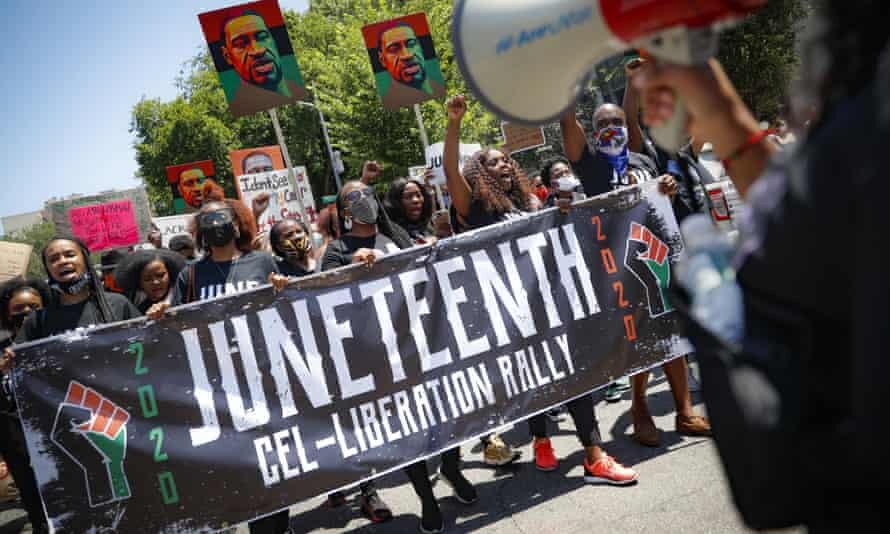Juneteenth: A Reminder for Intersectional Reform
America is a nation of contradictions.
For almost a hundred years, the nation celebrated freedom on July 4th, while at the same time supporting an industry that directly contradicts the notion of freedom: slavery.
The nation was founded by refugees and immigrants, by those fleeing their home country, searching for a better life. Yet, the rise of policing in America was fueled by the slave patrol, an institution that, for centuries, stopped thousands of people from fleeing their enslavement, from searching for a better life.
The values of freedom, justice, and liberty are said to be “American” values. However, throughout much of the country’s history, America itself has failed to live up to the values it espouses.
“Racism and injustice all plague our nation today — any dataset will tell you that discrimination runs deep in American society, forming the structural foundation of the country. And, when intersectionality comes into play, the result is a myriad of discriminatory actions, policies, and initiatives against deeply marginalized groups. ”
Today, the country celebrates Juneteenth, the now-federally recognized holiday. And, like much of American history, the celebration itself is an ironic contradiction. It is a celebration of delayed justice -- marking the day in 1865 when 250,000 enslaved Black Americans discovered their freedom was earned two years earlier, in 1863. Yet, it is a celebration of justice and a monumental aspect of the fight for freedom. A fight that, even today, is not over.
Racism and injustice all plague our nation today -- any dataset will tell you that discrimination runs deep in American society, forming the structural foundation of the country. And, when intersectionality comes into play, the result is a myriad of discriminatory actions, policies, and initiatives against deeply marginalized groups.
Guerline Jozef, president of the Haitian Bridge Alliance, spoke on her experience with intersectionality on a press call before President Biden authorized the Juneteenth legislation:
“Immigration is a Black issue. Immigration is a racial issue. Immigration is a social justice issue. And as a Black woman, I cannot separate my immigration status away from my Blackness.”
“As Black people in America, we face a lot of the same challenges and issues that Black descendants of enslaved people still face in this country. As immigrants, we’re still disproportionately faced with enforcement, disproportionately faced with detention, with deportation.”
Advocacy groups like African Communities Together (ACT) have joined with Haitian Bridge Alliance in calling for protections for undocumented Black immigrants as Juneteenth becomes a federal holiday.
Diana Konaté, director of ACT, summarized the intersectional connection between immigration and race:
“As Black people in America, we face a lot of the same challenges and issues that Black descendants of enslaved people still face in this country. As immigrants, we’re still disproportionately faced with enforcement, disproportionately faced with detention, with deportation.”
Black undocumented immigrants face twice the discrimination over both their race and immigration status.
The Congressional Black Caucus reported that “although Black immigrants only represent 5 percent of the undocumented population in the United States, they represent more than 20 percent of immigrants facing detention and deportation on criminal grounds.” Racism in this country extends to everything -- including (no, especially) immigration. It is our job to recognize this tie and then do something about it.
Discrimination in Immigration
This year, as many celebrate Juneteenth, we must not forget that the fight for justice and equality is not over -- especially regarding the intersectional issue of both race and immigration status for Black immigrants in America.
The Cameroon American Council is one of the many advocacy groups that hope to carry the celebration of Juneteeth into tangible change for Black immigrants. Cameroon is engaged in a bloody Civil War, resulting in roughly 40,000 undocumented Cameroonian immigrants living in the United States.
Many will be quick to judge their choice of immigration, yet one must be reminded of the intense and constant fear that undocumented immigrants experience on a daily basis. One Cameroonian immigrant, Susan, said, “We knew if we were sent back to Cameroon, we would be killed. Cameroon is temporarily unsafe for us.”
As of November 2020, the U.S. continues to deport immigrants like Susan back to Cameroon, despite the extreme instability and almost certain death that these immigrants would face upon arrival to their home country.
Mauritania, South Sudan, Somalia, the Bahamas, Ethiopia, and Sierra Leone are countries like Cameroon, where it is completely unacceptable and unsafe to forcibly deport immigrants back to their war-torn countries.
The Dallas Refugee Project calls on the Biden Administration, specifically Secretary Alejandro Mayorkas to grant Temporary Protection Status (TPS) to immigrants from these countries so that no immigrant, refugee, or asylum-seeker goes to bed at night wondering if it’s their last night in a safe and protected nation.
As we celebrate Juneteenth today, we must remember the intersectional connection between race and immigration in America. And we must be committed to tangibly fixing it. This begins with reforms to ICE and Border Security and granting TPS to undocumented immigrants from war-torn countries.
As Sirine Shebaya, executive director of the National Immigration Project of the National Lawyers Guild, stated:
“If the Senate is really serious about honoring the legacy of Juneteenth, then they must address the issues that are causing Black immigrants to be deported.”
America is, historically, a nation of contradictions. But it doesn’t have to continue to be. Let Juneteenth be a springboard to reforms that address the deep ties to injustice in the United States.
